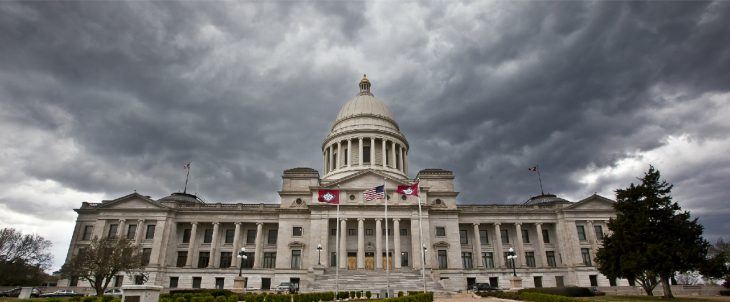Jonesboro legislators talk about recently completed legislative session
by May 2, 2019 9:22 pm 468 views

Perhaps the most important bill passed by the Arkansas General Assembly this spring was the more than $300 million highway funding bill supported by Gov. Asa Hutchinson. Three Jonesboro-area lawmakers – Sen. John Cooper, Rep. Jack Ladyman, and Rep. Dan Sullivan – discussed the reasons why they supported or opposed the bill during a lunch Thursday (May 2) at the Jonesboro Regional Chamber of Commerce.
Cooper and Ladyman supported the bill, while Sullivan voted against it. Cooper said Arkansas is one of the top 12 states in the country in terms of state highway miles, beating out states such as New York, California, and Florida. However, it ranks in the top 10 for lowest amounts spent to build and maintain roads, he added. Something had to be done.
“I supported it and I’m glad I did,” he said.
Ladyman agreed with Cooper. There are several unfinished projects in Northeast Arkansas such as the four-laning of U.S. 412 from Springdale to Paragould and the four-laning of U.S. 67 from Pocahontas to the Missouri border.
“We need to be connected,” Ladyman said.
The passed bill will charge an additional 3-cents per gallon for gasoline and another 6-cents for diesel fuel among other provisions. Sullivan thought a different bill that funded the highway program through other sales tax sources should have been considered. That bill would have funded the highways through other sales tax sources such as taxes paid on used cars, vehicle batteries, and other vehicle-related items. Those taxes are currently funneled into the state general revenue fund.
“I didn’t support the bill. I didn’t vote for it,” he said of the bill that was passed.
Each legislator was asked about key bills they sponsored and passed during the session.
Sullivan noted that he pushed a bill that allows for free speech across college campuses in the state. Universities had zones on their campuses that students have to seek permission to hold rallies. Arkansas State University was sued over these zones and the university was instrumental in working towards the passage of the bill, Sullivan said.
“We had a wonderful work group to allow free speech on college campuses,” he said.
Ladyman pushed a resolution to support the University of Arkansas receiving $100 million to develop a program to re-purpose spent nuclear rods. There is no way to reuse or reclaim these rods and a program to use them in smaller, more modern nuclear plants needs to be funded, he said. It would create green energy and remove these toxic rods from the public, he added. It’s possible an expanded engineering program might be created at the university as well.
“We’re going to train nuclear engineers at Fayetteville,” he said.
Cooper sponsored a bill that helps people who have been convicted of crimes, but are trying to improve their lives by finding careers. Many professions require extensive training and then board certification. During the board certification process, many of those convicted of previous crimes are not certified. Cooper said if someone is trying to make a better life and they meet certain criteria, they should be allowed to have a career.
The bill includes a criteria that boards can weigh during the consideration of a certification. That criteria includes how old the person was when the crime was committed, if they’ve had a repeat violation within the last 10 years, work history since, and other criteria.
“This is a major reform,” he said.
